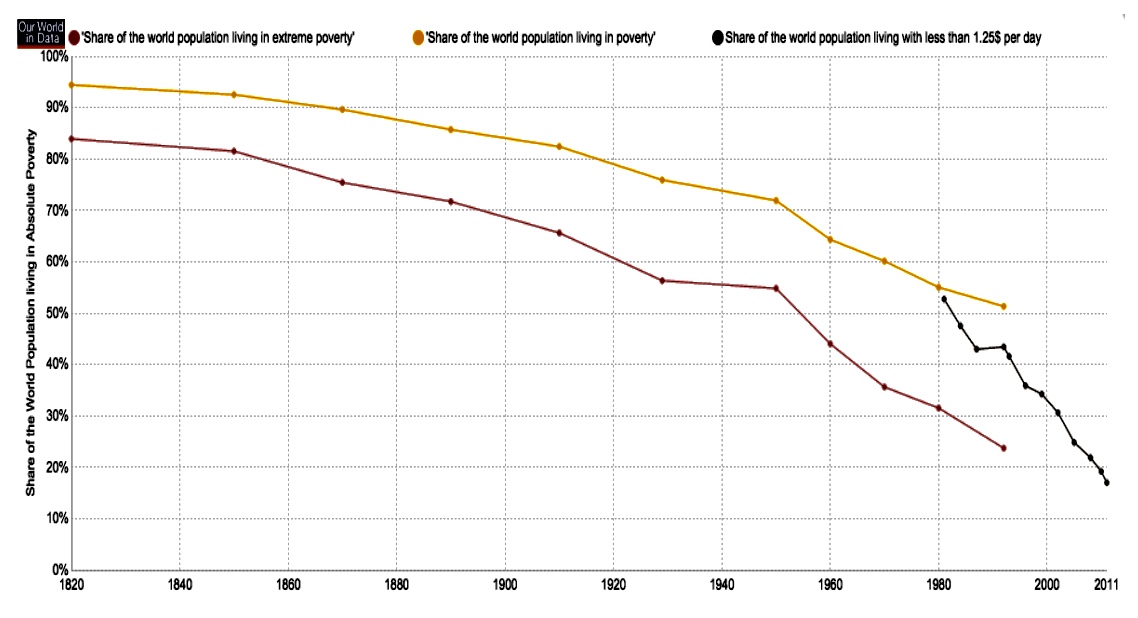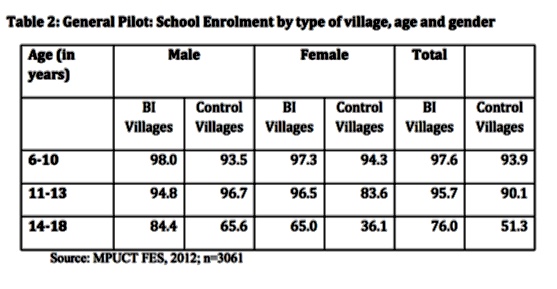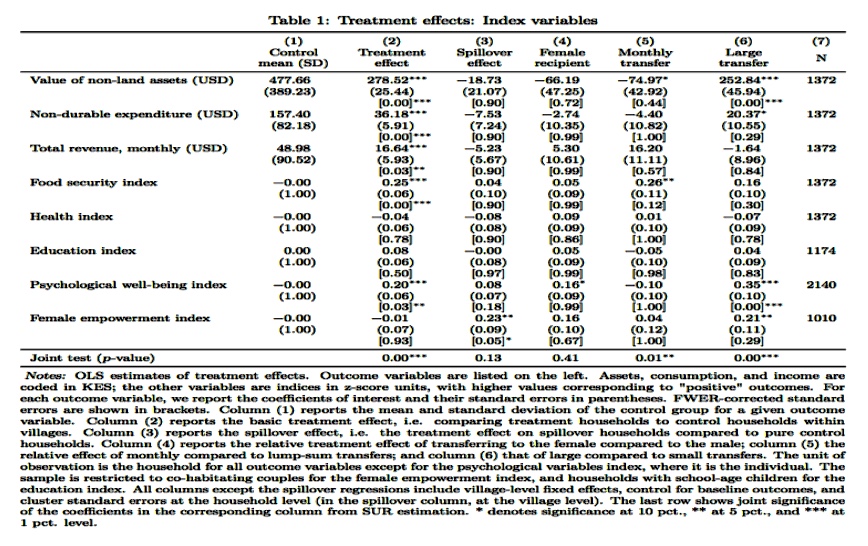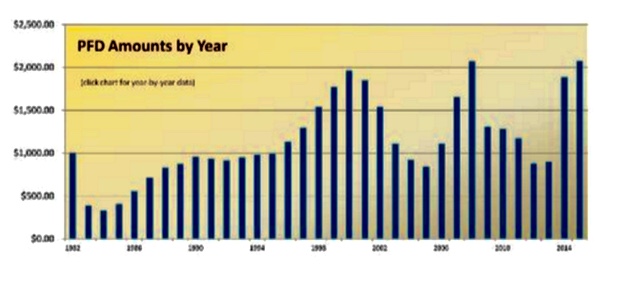Universal Basic Income: Empirical Studies
By: Abhishek Roy
Part 2 of SPI’s Universal Basic Income Series
Across developing and emerging economies, leaders are tasked to reduce income inequality and poverty. In the last century however, extreme poverty ($1.25/day) and poverty have both declined significantly worldwide. According to recent studies, since 1900 world population in general poverty decreased from around 85% to approximately 50% in 1990. The extreme poverty numbers have declined from about 70% to 25%. Many people attribute this impressive decline in the 20th century to the proliferation of free markets and capitalism across the world.[1]
 Share of Global Population Living in Poverty
Share of Global Population Living in Poverty
Many in the West (as well as globally) view the problem of poverty as best addressed through free-market solutions and capitalist or quasi-capitalist solutions, as opposed to socialistic or redistribution-type methods. Experts believe a failure to address inequality can in fact stunt economic growth (ex: United States income inequality). [2][3]
Universal Basic Income:
One solution for addressing poverty and income inequality in the 21st century is Universal Basic Income (UBI, also known as unconditional basic income, or basic income guarantee). This system is an “income unconditionally granted to all on an individual basis, without means test or work requirement”.[4] UBI resembles certain social security systems already in effect in various countries, such as the United States. The purpose of such a system is to create a minimum income for all households within a given population, regardless of performance or willingness to work. Such a system has been proposed in many contexts, as a model of “market socialism”[5] as well as one of free market capitalism. Taxation is a possible way to achieve UBI in a free market.[6] In this sense, UBI is not intrinsically socialist but can be applied in various economic frameworks.
Recent UBI Applications:
Kenya, 2011-present:
GiveDirectly is a nonprofit New York based organization, which is currently undertaking a UBI project in Kenya as a way of addressing rural poverty. GiveDirectly has pledged to donate, over the course of the next decade, a structured “ongoing” income with the purpose of fulfilling the basic living standards and requirements of 6,000 people in various villages across Kenya. According to its operating model, the nonprofit gives approximately $1000/year to each recipient household.[7] These millions of dollars are provided through the service M-Pesa, a mobile phone-based money transferring service. M-Pesa was actually launched in 2007 for microfinance and remittance purposes in various countries.[8] As of 2011, GiveDirectly operated in various regions in Kenya[9], especially in Western Kenya, making unconditional cash transfers or UCTs.[10] As of April of 2016, however, it pledged another decade of funding for such projects to provide basic income as a way of escaping poverty.
From 2011-2013, the Innovations for Poverty Action (IPA) conducted an evaluation on the effectiveness of UCTs in the villages, relative to those who were not aided. IPA evaluated a period beginning just before the implementation of UCTs and ending approximately 6 months after the UBI program stopped transferring cash. GiveDirectly began its UBI initiative in the formerly named Nyanza Province, and implemented this program by selecting some of the most poverty-stricken villages of the district, providing them with UCTs. To create an environment for case study, the organization selected 63 villages receiving these funds to be compared economically with 63 who were not receiving any form of financial aid. In addition, the households involved were divided into 3 distinct categories: UCT, spillover, and pure. UCT households are the 503 households that received the financial transfer. The “spillover” households are the 505 households that are a member of the same community as the 503 households that received the transfers, but did not receive any cash. The tertiary group, “pure”, is comprised of 432 households that did not receive any funds from the UCT program, nor did they live in the same village as the UCT households and likely did not receive any “spillover” effects as a result of increased capital in the region.[11]
According to the research study conducted by Johannes Haushofer and Jeremy Shapiro, there were tangible economic impacts as a result of the UCTs. During 2011-13, monthly payments of approximately $45 were provided for 9 months, in addition to “lump sum transfers,” which 245 of the 503 “treatment households” received. Larger transfer groups got additional amounts of approximately $1121 in 7 monthly installments. During this period, the consumption and investment of these communities both significantly rose, with the investment rising to a higher degree (23% vs. 58%). However, the researchers concluded there was no tangible positive effect on the spillover households as a result of the UCTs. Implicitly, the implementation of a UBI in the community achieved one goal. When populations in Kenya who required financial support received an infusion of cash, positive economic effects resulted. The fact the positive effects did not spill over to other households supports the correlation between UCTs and the increase in consumption and investment. Table 1 above shows the data on the effects of UCTs, including factors such as the spillover effect, the large transfer, and the monthly transfers.
India, 2011:[12]
India is another case of a country that possesses an abundance of communities and villages, which qualify as extremely impoverished by global economic standards. Different regions in the country have proposed a Universal Basic Income system numerous times, and some have implemented UBI schemes. In 2011, a project named “Madhya Pradesh Unconditional Cash Transfers Project” (MPUCT) launched in this region, with cooperation from UNICEF with the goal of reducing economic disparities and poverty.[13] Much like the Kenyan project, cash transfers underpinned this project. Over the course of nearly 18 months, 6000 people in rural Madhya Pradesh received a basic income. Each adult received 300 rupees (US $4.47) per month, and 150 rupees (US $2.23) were provided to each child per month over nearly the entire time period. Similar to research in Kenya, there were multiple studies done comparing those villages which were provided basic incomes versus those not aided financially in any way.
 Madhya Pradesh Unconditional Cash Transfers Project
Madhya Pradesh Unconditional Cash Transfers Project
One major result of the basic income was an increase in school enrollment of children in various villages. According to a 2012 study, both female and male groups of children had a higher level of school enrollment in the basic income (BI) villages compared to the “control” villages, where no basic income was provided. For example, the age group of 14-18 had a 76% school enrollment level among the BI villages, whereas among the control villages it was merely 51.3%.[14] The increase in income earning among BI households increased at a rate of 21% during the period of research, whereas the control households improved by merely 9%.[15]
Quasi-UBI Example: Alaska
Alaska Permanent Fund:
This fund is well known among Americans as a governmentally established income unique to Alaska exclusively. In 1976, the State Constitution of Alaska was amended to create the Alaska Permanent Fund (APF). Following a rush on “black gold” (oil), drilling leases produced approximately $900 million of revenue.[16] Since this commodity clearly was not an infinite source of wealth for the future residents of Alaska, the state created APF to put aside revenues.[17]
Alaska’s Permanent Fund Dividend
In 2014, Alaska provided each “year-round” citizen $1884[18], a share of the $6.8 billion net income of the fund. A dividend was taken from this net income and provided to 640,000 citizens. In the above figure, PFD stands for Permanent Fund Dividend. The value of the PFD has fluctuated greatly over the years of this legislative policy. Clearly, this initiative is independent from the other examples provided, as it was not based on addressing economic inequality or poverty, but was rather a long-term application of funds for a community. While there are arguments over whether this funding should continue, and if it is the best application of government funds, there is no substantial evidence to suggest this form of basic income had negative economic effects on Alaskans. Today Alaska is dealing with budget deficits, and it is likely the dividends will be reduced.[19]
Universal Basic Income, 2016:
In 2016 there are countless examples across the world of different movements and nations attempting to potentially promote and implement some form of UBI to deal with unequal distributions of wealth or extreme poverty. For 2017, the Netherlands plans to begin “Weten Wat Werkt”, or “Know What Works”, a guaranteed income initiative involving 6 test groups and unconditional funding.[20] The purpose of these experiments is to test human behavior and to observe tangible effects on the work ethic of a population, to see if the amount of hours worked among a population will decline, and finally, to investigate whether the same amount of investments and savings occur. The idea for the initiative is largely a result of educational based inquiry and philosophical research, and is one of many global examples of skeptics attempting to discover the most effective method for growing the economy while reducing poverty and income inequality.
Earlier in 2016, Switzerland had a historic national referendum over the proposal of a guaranteed basic income. It failed on a vote of 77 to 23.[21] While this was clearly a proposal the vast majority of the Swiss did not agree with, this referendum was the first of its kind in the world. This referendum was based on a proposal that would provide all adults with an unconditional monthly income of approximately 2500 Swiss Francs, regardless of employment status. This initiative was considered partly because of high living costs in Switzerland, and because a large number of the Swizz population are non-citizens. Notably, while only 23% of the Swiss supported this referendum, multiple surveys suggest in the near future a basic income or quasi-basic income proposal may be strongly supported/considered. According to a recent survey, 62% of the Swiss population believe UBI is now “on the table”, and 78% believe UBI is a legitimate referendum worth debating and discussing.[22] Attitudes towards UBI are apparently changing outside of Switzerland as well. In the United States for example, there is currently a project called the “Universal Income Project” which wants to popularize the concept of UBI. The group hopes to “popularize” and “organize” around what it believes to be a “radically commonsense idea”.[23]
Universal Basic Income, More Studies
There is objective evidence that implementation of UBI, whether by government or nonprofits, affects the targeted groups and regions positively in an economic sense. While there will surely be many more UBI studies over the next few years and even decades, clear empirical evidence currently supports the implementation of UBI as a means of combating poverty. These cases including programs in Namibia, Brazil, Canada and others not described here provide empirical evidence supporting some form of basic or unconditional incomes. Few programs had clear negative effects on a population’s economic growth or personal incentives. However, as of 2016 there still are not enough practical studies and examples of UBI implementation on a large scale to definitively conclude that UBI will succeed in major nations such as the US or EU.
-xxx-
[1] http://www.washingtonexaminer.com/amazing-chart-shows-thanks-to-capitalism-global-poverty-is-at-its-lowest-rate-in-history/article/2562224
[2] https://en.wikipedia.org/wiki/Income_inequality_in_the_United_States#Effects:_Economic
[3] https://www.whitehouse.gov/blog/2012/01/12/chairman-alan-krueger-discusses-rise-and-consequences-inequality-center-american-pro
[4] http://www.basicincome.org/basic-income/#history
[5] Social Dividend versus Basic Income Guarantee in Market Socialism, by Marangos, John. 2004. International Journal of Political Economy, vol. 34, no. 3, Fall 2004.
[6] Is Socialism Dead? A Comment on Market Socialism and Basic Income Capitalism, by Arneson, Richard J. 1992. Ethics, vol. 102, no. 3, pp 485-511. April 1992.
[7] https://www.givedirectly.org/operating-model
[8] Hughes, N., & Lonie, S. (2010). M-PESA: Mobile Money for the “Unbanked”: Turning Cellphones into 24-Hour Tellers in Kenya. Innovations: Technology, Governance, Globalization, 2(1–2), 63–81.
[9] Goldstein, Jacib. 2013. “Is it nuts to give to the poor without strings attached?” New York Times.
[10] “Operating Model”. GiveDirectly. Retrieved2015-01-12.
[11] http://www.princeton.edu/~joha/publications/Haushofer_Shapiro_UCT_2013.pdf
[12] http://unicef.in/Uploads/Publications/Resources/pub_doc83.pdf
[13] http://www.resilience.org/stories/2016-05-06/universal-basic-income-in-india-a-promising-experience
[14] MPUCT FES, 2012; n=3061
[15] MPUCT FES, 2012, n = 2016
[16] http://motherboard.vice.com/read/only-state-free-money-alaska
[17] http://www.apfc.org/home/Content/dividend/dividend.cfm
[18] http://pfd.alaska.gov/Eligibility/Requirements
[19] http://www.alaskapublic.org/2016/03/09/what-would-cuts-to-the-pfd-mean-for-alaskans-and-the-economy/
[20] http://www.theatlantic.com/business/archive/2016/06/netherlands-utrecht-universal-basic-income-experiment/487883/
[21] http://www.bbc.com/news/world-europe-36454060
[22] http://www.basicincome2016.org/#future
[23] http://www.universalincome.org/about/
Sources/Citations:
- Haushofer, Johannes, and Jeremy Shapiro. “Household Response to Income Changes (PDF).” N.p., n.d. Web.
- Standing, G., 2013. India’s experiment in basic income grants. Global Dialogue,3(5), pp.24-26.
- “MADHYA PRADESH UNCONDITIONAL CASH TRANSFER PROJECT – UNICEF.” SEWA Bharat, n.d. Web.
- Popper, Ben. “Tech’s Favorite Policy, Universal Basic Income, Is about to Get Its First Big Test.” The Verge. Vox Media, 18 Apr. 2016. Web.
- Matthews, Dylan. “A Charity’s Radical Experiment: Giving 6,000 Kenyans Enough Money to Escape Poverty.” Vox. Vox Media, 15 Apr. 2016. Web.
- “Is Giving Money Directly to the Poor a Good Idea?” YouTube. YouTube, 27 Apr. 2015. Web.
- Faye, Michael, and Paul Niehaus. “What If We Just Gave Poor People a Basic Income for Life? That’s What We’re About to Test.” Slate Magazine. MoneyBox, 14 Apr. 2016. Web.
- Cheeseman, Gina-Marie. “The Case for Universal Basic Income.” Triple Pundit People Planet Profit. TriplePundit, 29 Apr. 2016. Web.
- Klein, Philip. “Amazing Chart Shows Thanks to Capitalism, Global Poverty Is at Its Lowest Rate in History.” Washington Examiner. N.p., 07 July 2016. Web.
- Roy, Brototi. “Universal Basic Income in India – a Promising Experience.”RSS. Degrowth Blog, 6 May 2016. Web.
- Vandivier, David. “Chairman Alan Krueger Discusses the Rise and Consequences of Inequality at the Center for American Progress.” The White House. The White House, 12 Jan. 2012. Web.
- “History of Basic Income | BIEN.” About Basic Income. N.p., n.d. Web.
- Social Dividend versus Basic Income Guarantee in Market Socialism, by Marangos, John. 2004. International Journal of Political Economy, vol. 34, no. 3, Fall 2004.
- Is Socialism Dead? A Comment on Market Socialism and Basic Income Capitalism, by Arneson, Richard J. 1992. Ethics, vol. 102, no. 3, pp 485-511. April 1992.
- “GiveDirectly: Operating Model.” GiveDirectly. N.p., 2016. Web.
- Hughes, N., & Lonie, S. (2010). M-PESA: Mobile Money for the “Unbanked”: Turning Cellphones into 24-Hour Tellers in Kenya. Innovations: Technology, Governance, Globalization, 2(1–2), 63–81.
- Goldstein, Jacib. 2013. “Is it nuts to give to the poor without strings attached?” New York Times.
- “Operating Model”. GiveDirectly. Retrieved2015-01-12.
- Merchant, Brian. “The Only State Where Everyone Gets Free Money.”Motherboard. Vice Media LLC, 4 Sept. 2015. Web.
- “THE PERMANENT FUND DIVIDEND.” Alaska Permanent Fund Corporation. APFC, n.d. Web.
- “Eligibility Requirements.” Eligibility Requirements. N.p., 2015. Web. <http://pfd.alaska.gov/Eligibility/Requirements
- Waldholz, Rachel. “PFD Cuts Could Mean Big Ripples in Alaska Economy.” Alaska Public Media, 9 Mar. 2016. Web.
- Hamilton, Tracy Brown. “The Netherlands’ Upcoming Money-for-Nothing Experiment.” The Atlantic. Atlantic Media Company, 21 June 2016. Web.
- “Switzerland’s Voters Reject Basic Income Plan.” BBC News. BBC, 5 June 2016. Web.
- “Basicincome2016.org.” Basicincome2016.org. Basic Income Switzerland, n.d. Web.
- “About the Universal Income Project.” Universal Income Project, 2016. Web.
- “Our World in Data.” Our World In Data World Poverty Comments. N.p., n.d. Web.



